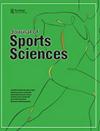Fundamental movement skills proficiency in preschool-aged boys and girls: Family matters.
IF 2.3
2区 医学
Q2 SPORT SCIENCES
引用次数: 0
Abstract
To investigate the associations of fundamental movement skill (FMS) proficiency with family factors, including socioeconomic status (SES) and caregiver characteristics, by sex in young children in China. Participants included 1,207 Chinese children aged 3-6 years in this cross-sectional study. Children's FMS, consisting of locomotor skills and object control (OC) skills, were assessed. Information on family SES and caregiver characteristics was reported by the parents. Sex differences in outcomes and the associations of FMS with family factors by sex were examined using SPSS 26.0. Boys scored significantly higher than girls in terms of overall FMS and OC skills (both p < 0.01). There were significant and negative associations between children's FMS and parental education level and parental body mass index (BMI), which varied by sex. Boys who were regularly cared for by parents had higher FMS and OC skill scores than did those who were primarily looked after by grandparents (both p < 0.01). This complex interplay between sex and family factors (i.e. parental education level, parental BMI, and the identity of primary caregiver) on FMS proficiency in young children underscores the urgent need for developing sex-tailored, family-involved, and socio-culturally adapted interventions to enhance FMS proficiency at the preschool stage.学龄前男孩和女孩的基本运动技能熟练程度:家庭问题
研究中国幼儿的基本动作技能(FMS)熟练程度与家庭因素(包括社会经济地位(SES)和照顾者特征)之间的关系,并按性别进行分类。这项横断面研究的参与者包括 1207 名 3-6 岁的中国儿童。研究评估了儿童的FMS,包括运动技能和物体控制(OC)技能。有关家庭经济和社会状况以及照顾者特征的信息由家长提供。我们使用 SPSS 26.0 分析了结果的性别差异以及 FMS 与不同性别家庭因素之间的关联。就总体 FMS 和 OC 技能而言,男孩的得分明显高于女孩(P 均小于 0.01)。儿童的 FMS 与父母的教育水平和父母的体重指数(BMI)之间存在明显的负相关,且因性别而异。与主要由祖父母照顾的男孩相比,经常由父母照顾的男孩的 FMS 和 OC 技能得分更高(均 p < 0.01)。性别和家庭因素(即父母的教育水平、父母的体重指数和主要照顾者的身份)对幼儿FMS能力的影响错综复杂,这凸显了在学龄前阶段急需开发适合性别、家庭参与和社会文化适应的干预措施,以提高FMS能力。
本文章由计算机程序翻译,如有差异,请以英文原文为准。
求助全文
约1分钟内获得全文
求助全文
来源期刊

Journal of Sports Sciences
社会科学-运动科学
CiteScore
6.30
自引率
2.90%
发文量
147
审稿时长
12 months
期刊介绍:
The Journal of Sports Sciences has an international reputation for publishing articles of a high standard and is both Medline and Clarivate Analytics-listed. It publishes research on various aspects of the sports and exercise sciences, including anatomy, biochemistry, biomechanics, performance analysis, physiology, psychology, sports medicine and health, as well as coaching and talent identification, kinanthropometry and other interdisciplinary perspectives.
The emphasis of the Journal is on the human sciences, broadly defined and applied to sport and exercise. Besides experimental work in human responses to exercise, the subjects covered will include human responses to technologies such as the design of sports equipment and playing facilities, research in training, selection, performance prediction or modification, and stress reduction or manifestation. Manuscripts considered for publication include those dealing with original investigations of exercise, validation of technological innovations in sport or comprehensive reviews of topics relevant to the scientific study of sport.
 求助内容:
求助内容: 应助结果提醒方式:
应助结果提醒方式:


